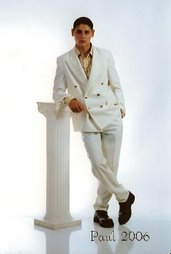Sunday, February 25, 2007
"Not that theres anything wrong with that"
The reading first begins about talking about the word queer, It's origins is from an AIDS activist group who began another group called Queer Nation. The word queer once a derogatory word for gays transformed into a term that was less derogatory and more of a name. When Seinfeld debuted in 1989 originally called The Seinfeld Chronicles it did rather poorly but in January of 1991 Seinfeld became widely popular. The reading begins talking about how the show was created and the actors mirror Seinfeld's real friends except in a more exxagerated way. The show targeted urbanity's and baby-boomers who looked forward to the new episode every Wednesday. As the reading describes the show seems to be generally heterosexually aimed. Seinfeld, Elaine, and sometimes George always had a new relationship with the opposite sex. Homosexuality has been illustrated in Seinfeld on three separate episodes they have homosexuality shown. Semiotics comes up in the essay referring to the pink triangle and the beginning of the episodes that were once used during the holocaust to mark the homosexuals for persecution. They describe how the name "Monk's" the restaurant they constantly go to is a brotherhood for men. Then the next few pages have dialect from some episodes about Seinfeld and his use of words or actions that make him very much masculine. Then the essay shows more dialect about how he has gay instances like when a baseball player separates himself from Jerry and Elaine mirrors it to her own personal relationships with men. The whole essay refers to how homosexuality comes up in the show and the different ways it comes up. The essay was pretty interesting by the ways it looks at how the show refers to homosexuality. Personally I don't understand how a person can look at every degree of a show to find homosexual tendencies in that specific show.
Subscribe to:
Post Comments (Atom)

1 comment:
So how do you feel about these readings and representations? When we talked in class, a lot of students had trouble thinking about queerness on television. Many of them didn't think it was something television needed to deal with or represent. We also talked about how television might be able to help people who are trying to come to terms with their own sexuality. Do you think that the ways that television shows are representing queerness are positive or negative? Are they helping or hindering society's acceptance of queer individuals?
Post a Comment